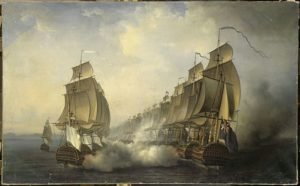Hon. John Whitmore Chetwynd
1754-88. He was born on 10 February 1754 at Heywood Park, Little Heywood, Staffordshire, the third son of William Chetwynd, 4th Viscount Chetwynd of Bearhaven, and of his wife Susannah Cope, the daughter of a baronet.
Chetwynd was commissioned lieutenant on 19 March 1779 and having served as second lieutenant of Admiral Sir George Rodney s flagship Sandwich 90, Captain Walter Young, at the Moonlight Battle off Cape St. Vincent on 16 January 1780 he was promoted commander of the Childers 10 on 27 January. He went out to the Leeward Islands at the beginning of the following year with news of the declaration of war on the Netherlands, and he was posted captain of the frigate Mars 32 on 3 February 1781, this vessel having been captured from the Dutch at St. Eustatius. He returned home in convoy under the orders of Commodore William Hotham, and in August the Mars arrived at Chatham to be paid off and never re-commissioned.
He was appointed to the Inflexible 64 in 1782, going out to the East Indies in February under the orders of Commodore Sir Richard Bickerton with four other sail-of-the-line and two frigates. The squadron took many months longer than anticipated to reach its station, and when it finally arrived on 21 October the ships were ridden with scurvy. On 20 June 1783 the Inflexible fought at the indecisive Battle of Cuddalore where she lost three men killed and thirty wounded, and she returned home in the following June to be paid off.
Chetwynd was appointed to the Expedition 44 in 1787, seeing service on the Jamaican station. He died on that island of yellow fever in November 1788, a day after he had been the life and soul of a dinner and ball thrown by the governor in honour of Prince William Henry, whose frigate Andromeda 32 had recently entered port.
Chetwynd was unmarried.
He was described as agreeable and accomplished in manner, kind and good-tempered, but unfortunately Chetwynd was an alcoholic whose terrible drunken influence extended to his followers, many of whom did not match the expected behaviour of a naval officer.

